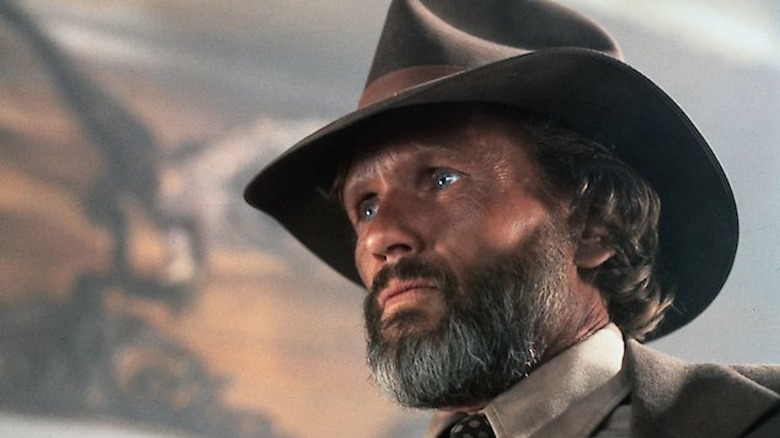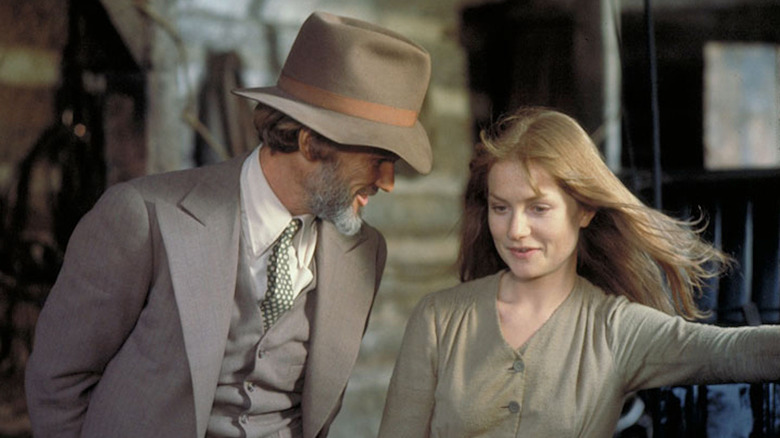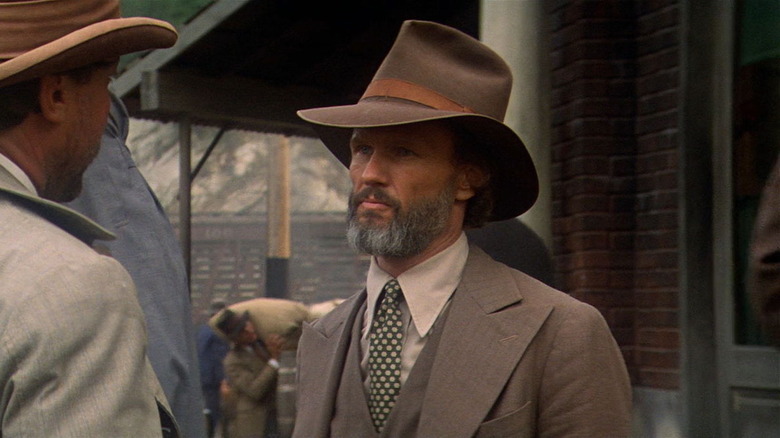Kris Kristofferson's Most Infamous Box Office Bomb Killed The Western Genre
We may receive a commission on purchases made from links.
For an industry often referred to as a "dream factory," it makes sense that what constitutes a success or a failure in the film business is based largely on perception. This is because the necessary facts in judging a film's financial performance are rarely available for outsiders to peruse. As detailed in the showbiz nonfiction classic "Fatal Subtraction: How Hollywood Really Does Business" by Pierce O'Donnell and Dennis McDougal, studios go to great lengths to conceal their "creative" accounting practices — which, in this case, allowed Paramount to use the profits from the Eddie Murphy blockbuster "Coming to America" to cover the company's overall losses (and, thus, plead poverty when it comes to paying out contractually promised net points to screenwriters and the like).
Still, some movies are such obvious flops there's no way they're actually, despite their lousy box office performance, secret hits, right?
Ask anyone with a general sense of film history to name a film that epitomizes the concept of a theatrically released bomb, and they will likely say "Heaven's Gate" before you finish asking the question. Michael Cimino's epic 1980 Western is a landmark movie in many ways, but any discussion of the film's myriad artistic merits will likely begin with an acknowledgment that it is the flop of flops — a $36 million production that, in grossing a piddling $3.5 million, bankrupt United Artists and drove a stake through the already weakened heart of New Hollywood. "Heaven's Gate" also pulls double dubious duty as the movie that killed the Western until its revisionist rebirth in 1992 via Clint Eastwood's "Unforgiven."
United Artists was now a union of bean counters who didn't much care for art
Before we get to the matter of the film's impact on the Western, let's address the notion that "Heaven's Gate" effectively killed United Artists. The truth is that the studio was on shaky ground years before Cimino's film flopped. Several of UA's top executives, who'd been butting heads with the leadership of the studio's parent company Transamerica Corporation, quit in 1978 and created Orion Pictures. Meanwhile, Transamerica had long been uneasy with UA's support for controversial films like Bernardo Bertolucci's "Last Tango in Paris" — to the extent that they occasionally demanded the Transamerica name be removed from all advertising.
Still, Transamerica was hot enough on the film industry that they considered rebranding United Artists to Transamerica Films — a heretical idea among filmmakers who respected UA's history as a company created by artists for artists.
Even though Transamerica was easily able to write off the film's $44 million loss, the failure ruined the company's appetite for further investment in the movie business. They sold UA to Kirk Kerkorian, who also owned the struggling MGM. UA did eventually experience a resurgence as an art house-friendly company by producing and/or distributing critically acclaimed movies like "Ghost World," "Hotel Rwanda" and "Bowling for Columbine," but its heyday was over. That day was likely coming regardless, but "Heaven's Gate" probably accelerated its decline.
As for whether Cimino's film outright killed the Hollywood Western for a decade-plus, that's another faulty perception.
The Western was already near death
The Western wasn't exactly in the best of shape in the 1970s. Eastwood was the genre's biggest star, but he was beginning to split his time with cop flicks after the massive success of "Dirty Harry." "The Outlaw Josey Wales," "The Apple Dumpling Gang" and even John Wayne's unnecessary "True Grit" sequel "Rooster Cogburn" performed well at the box office, but then, in 1977, George Lucas' "Star Wars" changed the movie business forever. Studios had been chasing blockbusters, but were mostly gambling on bestsellers, movie stars and commercially dialed-in filmmakers to hopefully give them the next "The Godfather," "The Sting" or "Jaws." Lucas' mainstream masterpiece provided them with a formula and a relatively unexploited genre: suddenly, space was where it was at.
There wasn't a major Western hit for the next three years until Walter Hill's "The Long Riders" did modest business in 1980. People were largely checked out on the genre, and were particularly cold to "Heaven's Gate" what with its toxic publicity. Even the presence of well-liked stars like Kristofferson, Jeff Bridges, and Christopher Walken (who, two years prior, had won a Best Supporting Actor Oscar for his performance in Cimino's "The Deer Hunter") couldn't entice moviegoers to give the slashed-down-to-149-minute epic a shot at their local theater/multiplex.
Cimino's movie is a patience-tester to be sure. Restored to its director approved 216-minute runtime, it features a lengthy graduation ceremony and other sequences that don't always seem to be advancing the plot. And the cinematography from Vilmos Zsigmond emphasizes dust over the wide-open, blue-sky beauty of Wyoming and Montana. The film unfolds like a thick piece of Russian literature, which I mean as a compliment though it may conjure images of doorstop-worthy tomes for some. This is a bummer because "Heaven's Gate" boasts some of Kristofferson's finest work, and tells an ugly tale of murder and massacre visited by ruthless ranchers on poor, powerless settlers near the turn of the American century.


